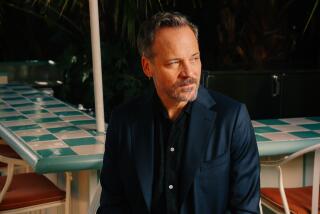British actor had a passion for the stage
Paul Scofield, one of the giants of the British stage who won an Academy Award for his portrayal of Sir Thomas More in the 1966 film “A Man for All Seasons,” has died. He was 86.
Scofield, who had been suffering from leukemia, died Wednesday in a hospital near his home in Sussex, England, his agent, Rosalind Chatto, said in a statement.
Considered one of the most talented actors of his generation, the tall, craggy-faced Scofield had a memorably rich voice that movie director Fred Zinnemann likened to the sound of “a Rolls-Royce being started.”
An admiring Richard Burton once said of his fellow actor, whose stage roles included Hamlet, King Lear, Macbeth and Othello: “Of the 10 greatest moments in the theater, eight are Scofield’s.”
Ranked with stage greats Laurence Olivier and John Gielgud by British critics and actors in the 1950s and ‘60s, Scofield was praised by critic Kenneth Tynan for “his power to enlarge a role until it fits him, as a hatter will stretch a bowler.”
Scofield originated the role of More, the morally courageous 16th century chancellor of England who defied King Henry VIII, in Robert Bolt’s “A Man for All Seasons” on the London stage in 1960.
A year later, he was playing More on Broadway, a role for which he won a Tony Award for best actor in a play.
“With a kind of weary magnificence,” a Time magazine writer observed, “Scofield sinks himself in the part, studiously underplays it, and somehow displays the inner mind of a man destined for sainthood.”
His best-actor Oscar-winning performance as More in Zinnemann’s movie version of “A Man for All Seasons” -- which won six Oscars, including best picture -- brought Scofield international fame.
Not that he sought such attention.
An intensely private man -- “Privacy is not negotiable” -- Scofield did not seek publicity and rarely gave interviews.
“It is a snare and a delusion to become too well known,” he once said.
Despite his place in the pantheon of great British actors, he viewed himself as “a worker” rather than “an actor of ego.”
Three decades after his Oscar win, Scofield received a supporting actor Oscar nomination for his role as Pulitzer Prize-winning poet Mark Van Doren in director Robert Redford’s 1994 drama “Quiz Show.”
Scofield, who had turned down a Hollywood studio’s offer of a seven-year contract in 1946 to continue his stage work, made his screen debut playing King Philip II of Spain in “That Lady,” a 1955 historical drama starring Olivia de Havilland.
Other movie credits included “The Train” (1964), the title role in “King Lear” (1971), “A Delicate Balance” (1973), “Henry V” (1989), “Hamlet” (1990) and “The Crucible” (1996).
Among his television credits were “Male of the Species” for NBC’s “Prudential’s On Stage,” for which he won an Emmy Award.
But Scofield preferred the stage to film and television.
His many stage triumphs included his acclaimed performance as Lear in a landmark production of “King Lear” for the Royal Shakespeare Company in 1962, and his searing performance as the tormented composer Antonio Salieri in the original 1979 London production of Peter Shaffer’s “Amadeus.”
“You know, it is only to an audience that a working actor like myself gives himself completely and at once,” he told Garry O’Connor, author of “Paul Scofield: The Biography.”
The son of a schoolmaster, David Paul Scofield was born Jan. 21, 1922, in the village of Hurstpierpoint in Sussex, England.
He attended Varndean School for Boys in nearby Brighton, where he joined a drama club and played his first role at 13: Juliet in a production of “Romeo and Juliet.”
“I had to wear an embarrassing blond wig,” he later recalled, adding that acting in the play “was a turning point, because thenceforward there was nothing else I wanted to do.”
In 1939, Scofield enrolled in the Croydon Repertory Theater School, which closed after the war started.
Exempt from military service because of deformed toes -- he later said he felt “deeply ashamed” for not serving -- he did further studying at the Mask Theatre School in London before joining touring companies and entertaining British troops.
In 1944, he joined the prestigious Birmingham Repertory Theatre and two years later moved to Stratford-upon-Avon, where he rose to prominence.
Of Scofield’s 1948 performance as Hamlet, Tynan wrote: “Mr. Scofield underplays his Hamlet in a manner of which verbal analysis can never explain the success. This is the best Hamlet I have seen. I know that there is now in England a young actor who is bond-slave to greatness.”
A year after his 1955 triumphant tour to Russia in “Hamlet,” Scofield accepted the appointment as a Commander of the Order of the British Empire. In 2001, he was appointed to the Order of the Companions of Honour, another prestigious British honor.
Over the years, however, he turned down offers of a knighthood. He had no interest in becoming Sir Paul Scofield. “It is just not an aspect of life that I would want,” he once explained. “If you want a title, what’s wrong with Mr.?”
In a 1988 interview with the Associated Press, Scofield said he felt privileged to be an actor.
“I feel incredibly lucky to have discovered early in my life, practically when I was a child, that I could do something that in the end I finally wanted to do all my life,” he said. “It has something to do with being completely removed from oneself, which doesn’t necessarily mean one is uncomfortable inside oneself.
“It just means it’s a great relief to be inhabiting somebody else. It can be a tremendously liberating sensation.”
In 1943, Scofield married actress Joy Parker, who survives him, as do their son, Martin, and daughter, Sarah.
--
More to Read
Only good movies
Get the Indie Focus newsletter, Mark Olsen's weekly guide to the world of cinema.
You may occasionally receive promotional content from the Los Angeles Times.










